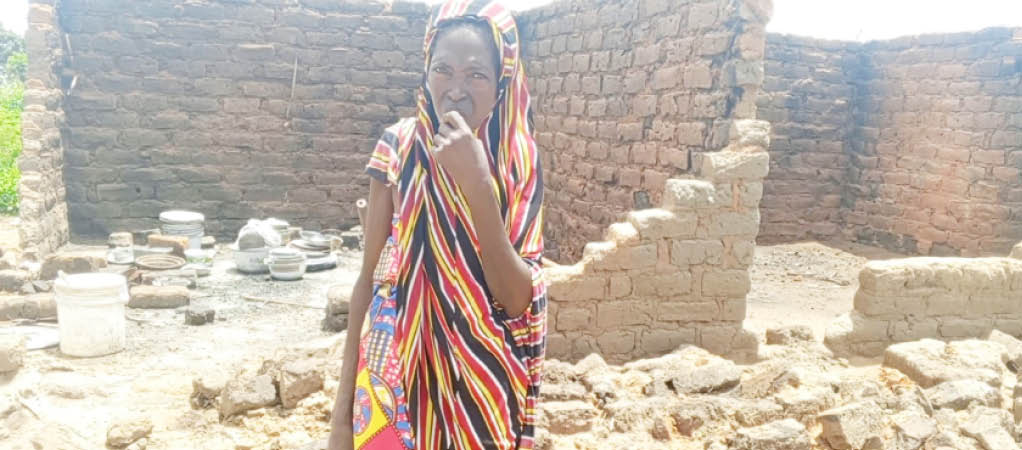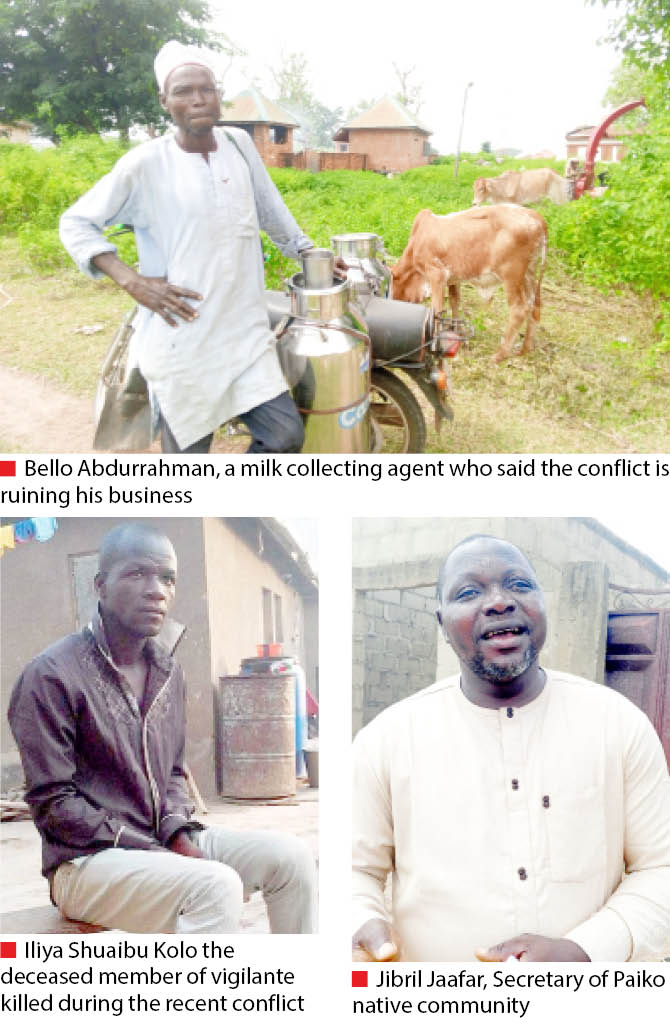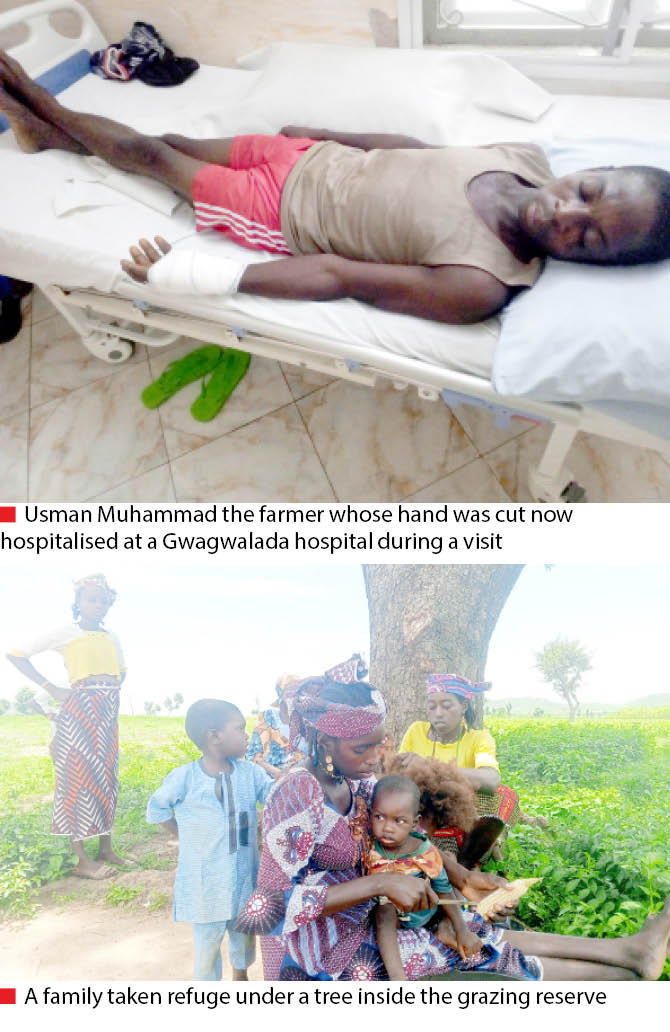Unresolved grazing issues push Abuja farmers, herders to endless conflict
There are four grazing reserves set up across four strategic axes of the Federal Capital Territory (FCT) to stop herders from roaming the streets of the country’s capital city. They are the Paikon-Kore grazing reserve located at Gwagwalada Area Council and three others at Rubochi, Shere and Karshi in Kuje, Bwari and Abuja Municipal area […]

One of the residents of the grazing reserve who lost her animals and all belongings to the recent conflict
There are four grazing reserves set up across four strategic axes of the Federal Capital Territory (FCT) to stop herders from roaming the streets of the country’s capital city. They are the Paikon-Kore grazing reserve located at Gwagwalada Area Council and three others at Rubochi, Shere and Karshi in Kuje, Bwari and Abuja Municipal area councils respectively.
In all the four facilities, the Paikon-Kore grazing reserve remains the most populous and has witnessed conflicts between herders and communities in the area, leading to loss of lives and destruction of both farm produce and animals.
The grazing reserve was originally sitting over 8,500 hectares of land that share boundaries with about four villages comprising Paikon-Bassa, Paikon-Kore, Dobi and Kace communities all within Gwagwalada council. “That was before it lost some of its territorial to the land grabbers, an official who is familiar with the terrain, has revealed. The number of nomadic primary school there are 2, one established by the Federal government known as model, and another been subsequently provided by the Gwagwalada area council, as been further learnt.
Dr Zayyanu Garba, a former director in the Department of Animal Services in the Federal Capital Territory Administration (FCTA), told Daily Trust Saturday that the Paikon-Kore grazing reserve was created in 1991 by the administration of a former military president, General Ibrahim Babangida (retd). He directed the then FCT minister, Muhammad Gado Nasko, to set allocate some lands and even forests for the project.
Tribunal sacks Plateau assembly speaker
Aliu Abdulqudus: I spent sleepless nights to win medals in scrabble

Dr Garba, who is now the Magajin Garin Malumfashi in his state, Katsina, said it was unfortunate that although the decision was taken and expected to take effect immediately, the issue of settlements and compensation to the affected farmers was yet to be realised. He added that initially, the farmers, who have continued to multiply, lived peacefully with the herders through shifting cultivation.
He also said that both the natives and herders were assisted through various interventions by the agric secretariat of the FCTA, which had the mandate to supervise the project. Farmers were assisted with inputs like fertiliser, seed and chemicals, while the herders got veterinary health services. There was also a nomadic primary education facility, as well as a milk collection centre.
He said the most important thing was to pay compensations, which he added had since been documented by the Department of Resettlement and Compensation under the Federal Capital Development Authority (FCDA).
He called for the actualisation of the master plan initiated by the Babangida government by paying the compensations and allocating lands to the farming community there.
Daily Trust had reported how a member of the vigilante group from Dobi community around the grazing reserve lost his life during one of the recent conflicts between herders and farmers. According to our source, Iliya Shuaibu Kolo was killed inside his farm. Herders insisted that he was killed during a confrontation.
A farmer, Usman Muhammad, was also badly injured and was still in the hospital during a recent visit by Daily Trust Saturday. Another victim of the crisis, who was simply identified as Isa, who had stayed in the community for 13 years, also had cuts on his head and back during a raid. Animals were also killed. Isa told our reporter that about 10 people pursued him while he ran for his dear life.
“I was not aware of what caused the attack. I just saw about 100 youths bearing arms. They attacked and left me in a pool of blood, believing that I was no more,” Muhammad narrated.
Daily Trust Saturday also visited Dobi community, where Isa Usman, the commander of the vigilante group in the town, said the recent conflict was provoked by an attack on a farmer, who happened to be a member of the group.
He said Iliya Shuaibu Kolo responded to a stress call after one Usman Muhammad was injured as he was trying to prevent a herder from encroaching on his farmland.
“The youths in the community mobilised to the site, and in the process, fight ensued, which led to Kolo’s death,” he explained.
Muhammad Usman, a member of the Miyetti Allah Cattle Breeders in Gwagwalada Area Council, said the two incidents took place outside farmlands.
“The first incident happened around a cattle route. They held the herder, and in an attempt to escape, he cut a farmer on his arm. They went back to his community to inform them; and they mobilised. However, nothing happened at the time. In the second incident, a herder grazed on a maize farm, and the farmer’s brother, who might not be aware of what transpired, confronted the herder, accusing him of encroachment.
“He went back and mobilised his people, and on arrival, since the herder could be traced, they proceeded to the nearby settlement and set it ablaze, killing animals on sight. Security men tried in vain to confront them. Our members, who were at the nearby weekly market that day, responded quickly and confronted them. During the clash, a member of the vigilante group from the farmer’s side lost his life,” he narrated.
Jibril Jaafar Paiko, secretary of the Paikon-Kore community, described the location of a grazing reserve there without the input of the locals as very contentious.
“It could be best described as putting the cart before the horse, which is a bad approach. The affected community just woke up to hear that there was a grazing reserve in the area. Farmers were not consulted and there was no compensation.
“Whether it is relocation or integration, they ought to have a comprehensive discussion and plan with the affected community. That was not done and pronouncement was made.
“And herders have been trooping to this area from all walks of life, with a sense of belonging that the place has been curved out for grazing. This has created a lot of crisis as farmers still lay claim to the land, which they said they inherited from their forefathers, wondering why the federal government would suddenly chase them away and give the land to herders. This is where the disagreement has come from.
“The most disheartening thing is that some of the herders come without cattle and start farming on the land. They convert the so-called cattle route to farmland.
“There is a local committee put in place to ensure peaceful coexistence between the farmers and herders but there are issues that only the government can resolve,” he said.
The community secretary called on the FCTA to intervene by giving a sense of belonging to both sides.
